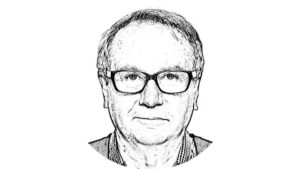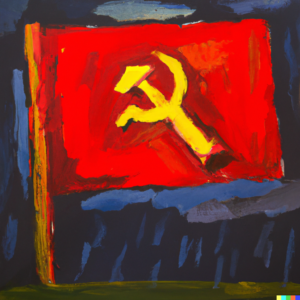After the 20th Party Congress: Analyses and Comments – By Wolfgang Hirn (ChinaHirn)
The following summary of the analyses of the 20th Party Congress is an English translation of a post by Wolfgang Hirn. To all those who know German, we recommend subscribing to his free and independent newsletter ChinaHirn, which is all about China – not least in these days when a sober, informed, factual view of China has become a rarity.
The 20th party congress is over. The names of the new leadership have been announced. In the days that followed, it was time for assessments. Journalists, think-tankers and economists were wondering what the consequences of this week-long spectacle might be for China and the rest of the world. A flood of analyses poured over the China community. I dived into this sea of opinions and fished out a few (Western) voices, which I summarise below in alphabetical order of the authors:

Wolfgang Hirn is a journalist, book author and China expert. After studying economics and political science at the University of Tübingen, he entered the world of business journalism. He started at the Kölner Stadt-Anzeiger, then moved to the Wirtschaftswoche, for which he was, among other things, a correspondent in Brussels. For almost 35 years he wrote for manager magazin, for which he worked until his retirement at the end of August 2019. Hirn has travelled regularly to China since 1986. He has published numerous books, including the bestseller “Herausforderung China” (Challenge China), which was published by S. Fischer Verlag in 2005. Most recently, he wrote about “China’s Bosses” (Campus Verlag, 2018). His new book on “Shenzhen – World Economy of Tomorrow” was published by the same publishing house on 11 March 2020. Hirn lives and writes in Berlin.
Sergio Grassi (Friedrich Ebert Foundation, Beijing), in an interview with ipg-journal (24 October), points to two initiatives that have been somewhat neglected in the coverage of the Party Congress: the Global Security Initiative and the Global Development Initiative. The Party Congress had reaffirmed the relevance of these two initiatives, “with which Xi’s China intends to decisively shape the world order in the coming decades”. And Grassi points out another aspect neglected in the Party Congress analysis: “According to the social contract presented (let’s call it the Red New Deal), lower economic growth is to be compensated by a better quality of life.” By better quality of life is meant better public services, more comprehensive social security and more environmental protection and redistribution.
Mikko Huotari (Merics) sums up in the journal “International Politics” (November/December issue) that Xi Jinping has prevailed all along the line. This applies above all to the personnel situation at the top. He sees “even more loyal comrades-in-arms at the central levers of power in Beijing”. No successor has been visibly put in place. As a result, almost an entire generation of young leaders may have been skipped. Huotari believes that we have to be prepared for a longer reign of Xi: “There is much to suggest that Xi will continue to occupy the dominant position of power in the Chinese system in the long term.”
For Ian Johnson (Council on Foreign Relations/CFR, New York), Xi got almost everything he wanted at the Party Congress. In his CFR blog (23 October), he poses the question of whether Xi is the most powerful leader after Mao to be answered as follows: “This has yet to be proven.” He compares Xi to Deng Xiaoping, who radically changed China. In contrast, Xi – so far anyway – has not radically changed China. He sees potential weaknesses in Xi’s policies: Covid, the economic situation and the high expectations he raised regarding Taiwan. His conclusion: “All of this raises questions about the nature and durability of Xi’s power.”
Cheng Li (Brookings) writes in the Brookings article “Around the Halls: The Outcomes of China’s 20th Party Congress” (25 October) that the new leadership team offered five surprises. The last time this happened was 25 years ago. Secondly, there is not a single member of the Communist Youth League in this body. Thirdly, Cheng Li is surprised that Li Qing, who is being considered as head of government, has no experience as vice-premier, which used to be the norm. Fourth, he would have expected some younger politicians of the so-called sixth generation in the Politburo. And fifth, the military leadership would have changed substantially.
Rana Mitter (University of Oxford), writing for The Guardian (23 October), sees an end to an open China: “There are signs that the China of the 2020s may be considerably less open than the one we have known for some four decades from the 1980s to 2020.” The open but illiberal China had ended in March 2020 with the Chinese Covid strategy. A strategy closely associated with the name of Xi, who therefore promised no change to the zero covid strategy in his speech, at least in the short term. For Mitter, this strategy, which hardly allows any more exchange with foreign countries, has negative consequences: “This may well affect China’s international competitiveness.” He sees a new message emerging: “China’s population is encouraged to work, study and play at home. Motto: “Why go overseas, when China is the most advanced society in the world?”
Uwe Parpart and David Woo (Asia Times, Hong Kong) in the “Asia Times” of 28 October have a somewhat different view of the personnel decisions than most Western commentators. While they see only yes-men in Xi’s entourage, Parpart and Woo see an advantage in this loyal group: “The fact that Xi in his third term will not have to engage in factional political infighting should allow him to focus his energy on implementing his policy agenda. In the past, there had been tensions between Xi and head of government Li Keqiang. This will not happen with the designated head of government Li Qiang. “This Li will have a freer, more trusted hand than his predecessor,” write Parpart and Woo, who, by the way, assess Li Qiang much more positively and economically competent than others.
For Stephen Roach (Yale), the Party Congress brought no surprises: “It revealed little we didn’t already know about China”, he writes in the “South China Morning Post” of 26 October. The composition of the new Politburo Standing Committee did not surprise him either. In addition to Li Qiang, he sees Wang Huning in particular as an influential person in this leadership clique. He is Xi’s ideological alter ego and the prominent representative of the thesis that the USA is in decline. For Roach, the “main message” of the Party Congress is: “China will stay the course of the past five years. This means national security takes precedence over economic growth.”
Kevin Rudd (Asia Society Policy Institute/ASPI) entitled his first analysis of Xi’s speech “The Return of Ideological Man” (ASPI, 18 October). It set out Xi’s Marxist-Leninist world view – “a world view that also drives his nationalist ambition of making China the preeminent regional as global power by mid-century”. As far as economic policy is concerned, it is clear that “the shift in economic policy direction over the past five years (back to the state and retreat from the market) will continue over the next five years”. Rudd also looks at the Taiwan passage in Xi’s report. He classifies the language there as “relatively conciliatory”. A peaceful solution is sought, but the use of force is not ruled out. Rudd: “This is not a new formulate.” But what is new is “Xi’s warning that his harsher measures on Taiwan are targeted not at the bulk of the Taiwanese population, but instead at the small minority of Taiwan independence supporters and those foreign states (USA) that back them”.
Michael Schaefer (ex-ambassador) comments in the “Hauptstadtbrief” (29 October) that “the era of Deng Xiaoping, which brought China 40 years of prosperity, is finally over”. The “inevitable paradigm shift” has been sealed by the Party Congress. The ex-diplomat is concerned about how Germany and Europe must react to this paradigm shift. It is no longer business as usual, but a redefinition of relations with China: “Europe must make it clear to China where it stands in the geoeconomic and geopolitical conflict between the USA and China. In terms of values, Europe is much closer to America, but there are significant differences in interests between the two global economic powers, the USA and Europe.
Willy WoLap Lam (The Jamestown Foundation) analyses in “China Brief” (24 October) above all the personnel changes in the Party’s top bodies. The Politburo and its Standing Committee are “largely apparatchiks with expertise in areas such as ideology, propaganda, and party construction”. He notes “a near-total absence of pragmatically minded technocrats experienced in finance and economics”. The Xi Jinping Faction (he abbreviates it as XJPF) has won and there are no more representatives of the Communist Youth League and the Shanghai Gang in the Politburo. Besides this, WoLap Lam sees another major triumph of Xi at the Party Congress, namely the inclusion of “Xi Jinping Thought on Socialism with Chinese Characteristics for a New Era” in the new Party Constitution. He criticises that the Party Congress “was focused almost entirely on theoretical concepts”.
For Jörg Wuttke (European Chamber of Commerce in China, Beijing), a “fundamental change” has taken place in the party’s personnel policy: “People no longer get into top positions on the basis of meritocratic qualities, but through their loyalty to the president”, says Wuttke in an interview with “The Market NZZ” (25 October). In the next five months (until the National People’s Congress), practically the entire economic-political elite will step down in one fell swoop. Wuttke: “This is dangerous at a time when the Chinese economy is already limping.” For Wuttke, the loss of economic competence at the top has two consequences. Firstly: “Market opening will no longer continue.” And secondly: “We have to say goodbye to the idea that China’s policy is basically still tailored to economic growth.”
Translation: Tina. Illustration: Dall-e image generator, input: Wilson.
